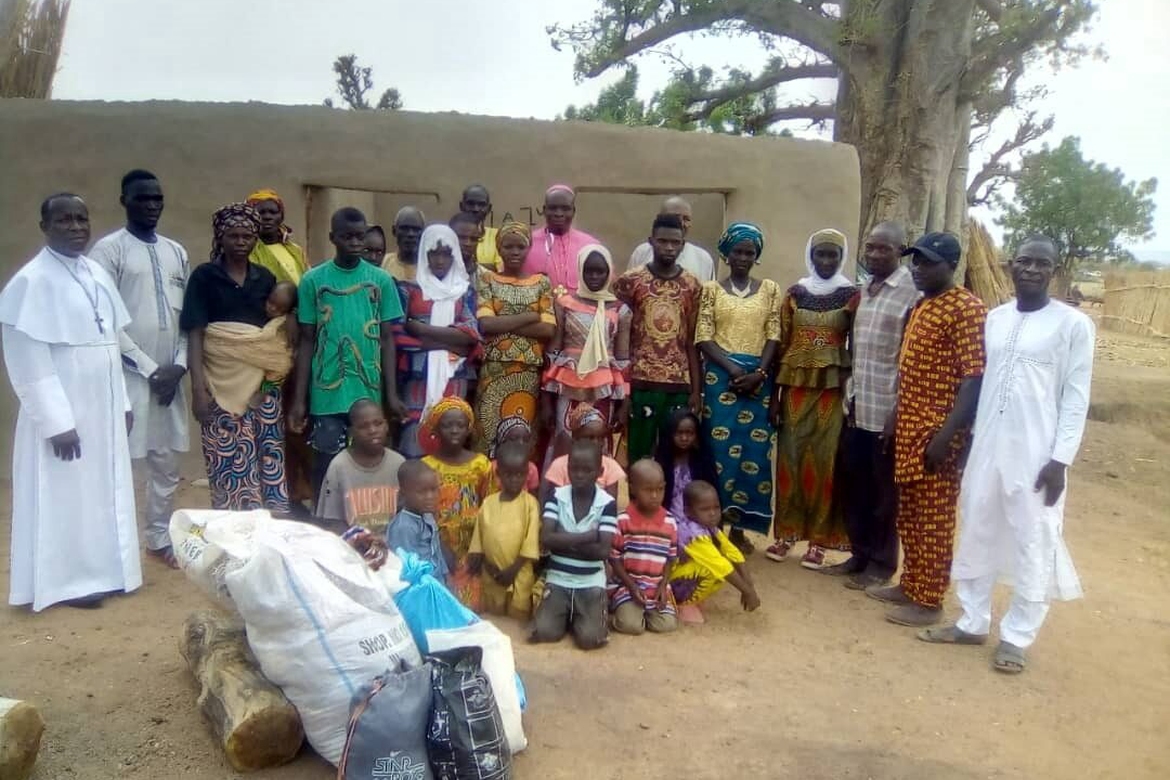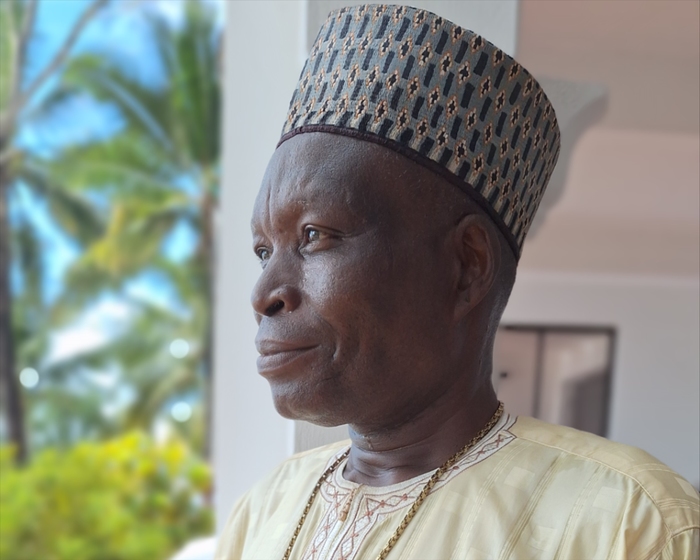His Family Killed, Nieces and Nephews Kidnapped
The Nigerian bishop John Ali Shettima Chibok is a victim of terror; he fights against violence.

Bishop John Ali Shettima Chibok together with people who have been displaced in the Chibok area of Borno State. Most in the camp are Christians.
Written by Johannes Morken. First published on stefanus.no 10.09.14. Photo: Private
Bishop John Ali Shettima has endured unspeakable losses. Boko Haram, the Islamist extremist group, killed his father and three brothers. Then they abducted many of the orphaned children left behind. Today, the bishop is determined to protect other young people from being drawn into terrorism, aiming to transform a landscape of violence into one of hope.
"For Christ’s sake, remember the persecuted Christians in northeast Nigeria," urges Bishop Shettima
The Personal Cost of Boko Haram’s Terror
Bishop Shettima was raised Muslim in Chibok, Borno—a region now infamous after Boko Haram kidnapped 276 schoolgirls in 2014, most of them Christian. Chibok became a global symbol of the violence faced by Nigerian Christians, but the bishop's family was already suffering long before. When Shettima embraced Christianity, his family followed, and Boko Haram retaliated, killing his father and brothers. Taking in the widows and orphans, he brought them to his home in Chibok for safety. But in April 2014, Boko Haram returned, storming a school and kidnapping six of his deceased brothers' children, four of his sister’s children, and one of his sisters-in-law. Others in his extended family were also taken.
Today, ten years after that raid, 115 abducted individuals have made it home, including six of the ten children who call Bishop Shettima “uncle.” Some have returned scarred and ill, others with children of their own, all bearing deep spiritual, social, and physical wounds. "We offer what we can through counseling and Bible study, but the trauma lingers," he explains.
From Conversion to Leadership
The bishop himself converted to Christianity in 1990, a decision that led to significant persecution from his own family. However, many have since followed his path to Christianity, and six of his family members have also become pastors. He has since devoted himself to supporting his community through education and interfaith initiatives to curb the recruitment of vulnerable youth by Boko Haram.
A Region Plagued by Poverty and Extremism
The roots of Boko Haram’s influence run deep in Nigeria’s northern regions, where over 70% of people live below the poverty line. Founded in 2002, the group expanded its violent insurgency in 2009, preying on impoverished, unemployed youth. In Borno, where Bishop Shettima serves, Boko Haram’s call to "purify" Islam by opposing Western education and government systems has fueled years of religiously motivated violence. While both Christians and Muslims have suffered, Boko Haram's initial targets were Christian communities, whose members often lack political and economic power and face systematic discrimination in northern Nigeria. "The persecution of Christians didn't happen overnight. Churches and Christian institutions were the first targets of Boko Haram. Christians have suffered far more violence than Muslims, although Boko Haram has also attacked mosques, schools, markets and emir palaces," says John Ali Shettima.
The persecution of Christians didn't happen overnight.
Supporting Displaced Families in Crisis
The bishop, who now oversees projects in displaced persons camps, estimates that 85% of camp residents are Christian. After a recent Boko Haram attack targeted both a wedding and a funeral in Chibok, resulting in the deaths of 18 Christians and injuring 42, he returned to deliver food, blankets, and school supplies. In camps, Christians and Muslims live side by side, sharing the little they have.
"I’ve seen Christian widows from Kaduna touched by gifts from Muslim visitors. Gestures like these soften hearts and build the unity we need," he reflects. Despite years of bloodshed, Bishop Shettima’s faith leads him to believe that healing and reconciliation are possible. "Nothing is impossible for God," says Judy Ugwu, a Christian mother of four who recently forgave her attackers.
Empowering Youth to Counter Terrorism
To combat the radicalization of vulnerable youth, Bishop Shettima has partnered with Procmura, an African organization supported by Stefanus Alliance, dedicated to bridging divides between Christians and Muslims across twenty countries. Together, they’ve created forums for young people, Christian and Muslim alike, to build relationships, understand each other, and resist extremist influence.
"Our youth taught us that if we truly want peace, we must empower them," says Bishop Shettima. Since August 2022, his programs have seen fewer Boko Haram attacks, as young people now have pathways to stability, including scholarships and small-business grants. Shettima recently addressed 1,300 youth in Yobe, encouraging mutual understanding between Christian and Muslim youth.
Our youth taught us that if we truly want peace, we must empower them.

"Please do not forget our Christian brothers and sisters in Chibok. Persecuted Christians also need financial support," says Bishop Shettima. Photo: A. M. Gihlemoen
Addressing Systemic Injustice and Looking Forward
But the challenges remain. Northern Nigeria is predominantly Muslim, where Christians often struggle to find jobs and are sometimes denied opportunities. Bishop Shettima warns that religiously and politically exclusive policies only increase tensions, urging his fellow Christians to practice patience and forgiveness.
In a country where the population is evenly divided between Christians and Muslims, the bishop envisions a day when Christians and Muslims can unite not just in shared suffering, but in mutual respect and hope.
"Please do not forget our Christian brothers and sisters in Chibok. Persecuted Christians also need financial support".
A Vision of Peace and Reconciliation
He sees interfaith cooperation, empowerment for young people, and economic opportunity as essential steps to a peaceful Nigeria. And while the road to reconciliation is long, Bishop Shettima remains steadfast. Through interfaith partnerships, educational programs, and acts of goodwill, he continues to nurture a hopeful future for his country.